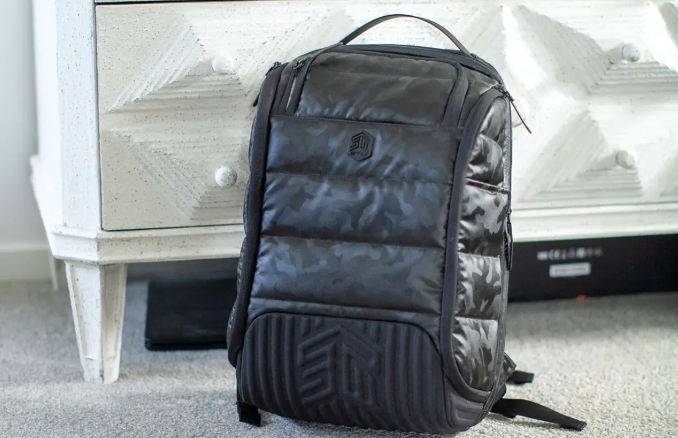Laptop backpacks have become essential for anyone who must carry their laptop and other essentials. However, knowing the considerations when choosing a laptop backpack can take time and effort due to the many options available. From size and comfort to durability and organisation features, you should consider several factors to ensure you choose the right bag.
In this article, we will explore some of the most important factors to consider when selecting a laptop backpack, helping you to make an informed decision and find the perfect bag to protect your laptop and make your daily commute or travel more comfortable and convenient.
<h2>Size</h2>
One of the most important factors to consider when selecting a laptop backpack is size. The pack should be able to comfortably accommodate your laptop without being too tight or too loose. It’s essential to measure your laptop’s dimensions and choose a backpack that fits those measurements, with a little extra room if you need to carry other items like books or a tablet.
<h2>Comfort</h2>
Comfort is crucial when choosing a laptop backpack, especially if you carry the bag around for extended periods. You want to avoid having sore shoulders, neck, or back after a long day of carrying your backpack. The straps are one of the most critical comfort features when selecting a laptop backpack.
These are some of the comfort aspects to check:
<h3>Adjustable straps</h3>
Look for backpacks with wide and adjustable straps that evenly distribute the backpack’s weight across your shoulders. Adjustable straps allow you to adjust the length of the straps to suit your height and body type, ensuring that the pack sits comfortably on your back.
<h3>Padding</h3>
Padding is another essential comfort feature when selecting a laptop backpack. The back panel and shoulder straps should be well-padded to prevent discomfort from the pressure of the bag against your back and shoulders. Thick padding not only adds to the overall comfort of the backpack but also helps to protect your laptop and other items from damage due to impact.
<h3>Weight distribution</h3>
A sternum strap is also a helpful feature to consider when selecting a laptop backpack. This strap, which
goes across your chest, helps distribute the backpack’s weight evenly and reduces strain on your shoulders and back. It also helps to keep the backpack stable, preventing it from shifting around while you’re on the move.
<h3>Bag shape</h3>
In addition to these features, consider the shape of the backpack itself. Some packs are designed with a curved or contoured shape that conforms to your back, providing extra comfort and support.
<h2>Durability</h2>
Regarding durability, you want a laptop backpack that can withstand daily use and the occasional bump or scrape. The backpack’s material is an important consideration when it comes to durability. Nylon and polyester are famous for laptop backpacks because they are sturdy and resistant to tearing and abrasions. They are also lightweight, which can help reduce the bag’s overall weight.
It’s important to note that while heavier backpacks may be more durable, they can also be more taxing to carry around, especially if you have a long commute or need to travel long distances with your backpack. You should find a balance between durability and weight when choosing a laptop backpack so you don’t end up with a bag that is too cumbersome to carry comfortably.
<h2>Organising features</h2>
Choose a backpack with many built-in organising features, which can help keep your items organised and easily accessible when you’re on the go.
Here are some of the critical organisational features to look for:
<h3>Compartments</h3>
A good laptop backpack should have several compartments to separate and organise your items. Look for a specific case for your laptop and other partitions for your charger, cables, documents, books, and other things.
<h3>Pockets</h3>
Pockets are a great way to keep small items like pens, keys, and your phone organised and easy to access. Look for backpacks with several pockets, both inside and outside the bag, to keep your items in place.
<h3>Sleeves</h3>
Some laptop backpacks come with different sleeves or pockets for tablets or other devices, which can be helpful if you need to carry multiple devices.
<h3>Attachments</h3>
Look for backpacks with attachments like key loops or carabiner clips to keep your items secure and organised.
<h3>Accessibility</h3>
Make sure your backpack has easy access to your items. For example, if you need to access your laptop frequently, look for a bag with a side zipper or a top-loading design.
<h3>Style</h3>
While not the primary factor, style is still important when choosing a laptop backpack. You want a backpack that reflects your style, whether a sleek and professional backpack for work or a more casual bag for everyday use. Consider the backpack’s colour, design, and overall aesthetic when making your choice.
<h2>Water-resistance</h2>
If you live in a rainy area or plan on travelling to a wet climate, consider a laptop backpack with water-resistant or waterproof material, which will help protect your laptop and other items from moisture damage.
<h2>Price</h2>
Laptop backpacks can range in price from budget-friendly to high-end luxury models. Consider your budget and what features are most important to you when choosing.
<h2>Conclusion</h2>
In summary, when choosing a laptop backpack, it’s essential to consider the size, comfort, durability, organisation features, and style. By considering these factors, you can find a laptop backpack that meets your needs and suits your personal style. Whether you are a student, a professional, or a frequent traveller, the right laptop backpack can make a significant difference in ensuring the safety, comfort, and accessibility of your valuable equipment.

